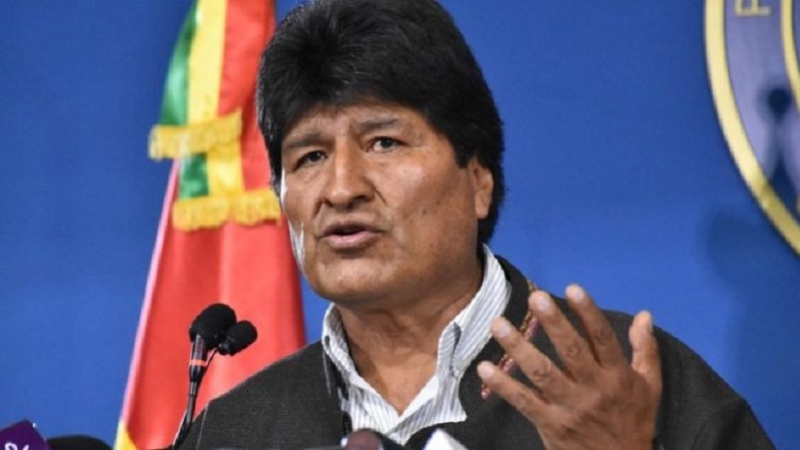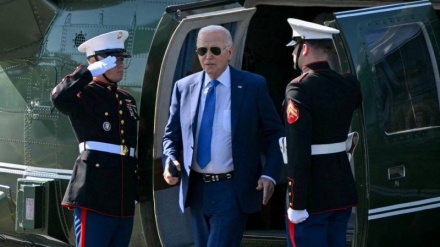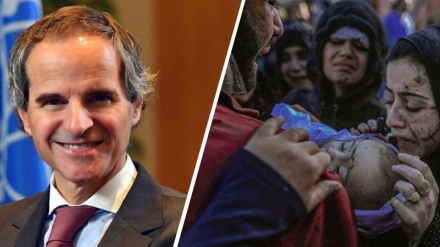Who is behind Morales' resignation?
The Trump administration has, since taking office, pursued a "Neo-Monroe Doctrine" based on the longstanding premise that the US must indisputably dominate the Western hemisphere, and has aggressively pursued the removal of governments critical of American hegemony.
This has included hostile policies towards Cuba and Venezuela. With exiled ex-President of Bolivia Evo Morales being an ally of those governments, there is likelihood the opposition which replaced him will be stridently more pro-Washington.
The following is an article in this regard by staff writers of Iran's English language website of 'Fars news agency' under the heading: "Who is behind Morales' resignation?"
President of Bolivia Evo Morales resigned on Sunday Nov. 10th after Bolivia's military warned him to step down accusing him that the country's election held on October 20th had been manipulated, while a growing number of world states and leaders are calling the situation a coup or pseudo-coup against the socialist ruler.
The contested October election has led to protests and riots. On Saturday Nov 9th, protesters burned the house of Oruro city Governor and Morales ally Víctor Hugo Vásquez. Other acts of violence – including the Venezuelan Embassy being targeted with dynamite – were reported in the capital, La Paz.
The Bolivian leader called for a snap election earlier on Sunday, after an Organization of American States (OAS) mission said it could not confirm his victory last month. Morales expressed hope that a new election would help avoid further unrest, but his decision galvanized the opposition, who took to the streets to call for his immediate resignation.
Although he agreed to a re-run, the indigenous socialist leader found himself under pressure from the military and other elites within the state. With his own political allies under attack, Morales said he was standing down in order to protect them. Supporters of Morales say democracy has been subverted, and that his removal is a coup.
In addition to a growing number of Latino nations, figures like UK Labour Leader Jeremy Corbyn have stepped forward to state that the Bolivian President has been forced out of office by a coup by the country’s military.
Although the United States has made little public comment on the situation in La Paz, it nevertheless gave key support for new elections which it claimed reflect "the will of the people of Bolivia"- supporting a finding by the D.C. based and funded OAS which has taken a line against the Morales government. However, there are some things worth keeping in mind: Evo Morales was a critic of the United States and its foreign policy in Latin America.
The Trump administration has, since taking office, pursued a "Neo-Monroe Doctrine" based on the longstanding premise that the US must indisputably dominate the Western hemisphere, and has aggressively pursued the removal of governments critical of American hegemony. This has included hostile policies towards Cuba and Venezuela. With Morales being an ally of those governments, there is likelihood the opposition which replaced him will be stridently more pro-Washington.
The OAS as a legitimate monitor of elections in Bolivia shouldn't be taken seriously. There are good reasons why. Based and funded in Washington D.C. the organization is little more than a partial vehicle for US foreign policy interests in the region which has, despite claiming to represent all countries in the Americas, repeatedly isolated and ostracized countries hostile to the United States. Cuba for example, was suspended from membership from 1962 to 2009, admitted in this era due to Obama's willingness to reconcile with Havana.
However, the atmosphere in Washington has changed for the worse. Since his election, the Trump administration has taken a more hard line approach against countries in the Latin America under the mantra of what has been described as a "Neo-Monroe doctrine" that is the foreign policy objective that no government who is hostile to, critical of the United States, or too close to other powers should be tolerated.
Historically, Washington has repeatedly courted right wing elites in these countries and supported them in quashing popular socialist movements that contravene the US hegemonic rule and interests. On this background, and with the accusations against Morales stemming largely from the OAS, there is a substantial likelihood that the Washington has also sought to, albeit indirectly, usher the Evo leadership out of office.
With his administration of course not being authoritarian, but a viable democracy, and secondly not economically disastrous with his policies having made great gains for standard of living in the country, this has made it harder to attack and advocate for change publicly- thus resulting in a "soft" approach by courting a series of state elites, in this case the military and wealthy oligarchs.
This outcome largely resembles that of Brazil in the past few years, whereby the hugely popular socialist President Luiz Inácio Lula da Silva was removed from office by elements of the state apparatus, imprisoned under stumped up charges and then with an ultra-pro-US leader, Jair Bolosonaro ascending to power.
Given this, Morales' eventual replacement is likely to be of a similar caliber, which will quickly move to assert the pro-capitalist, pro-US business elite with the view of undoing his socialist economic legacy, and likely moving to offer Washington support on issues such as Venezuela.
As a whole, the Evo Morales saga comes to its climax with one wondering if the Monroe Doctrine has struck yet again? Washington's support has been subtle and low key, but evident. Bolivia loses its first indigenous leader, a man who never had any record of misrule or heavy-handed governance. The MAN stepped down to keep his nation from violence.
Meanwhile, Morales has condemned US President Donald Trump for "recognizing the de facto government" of Jeanine Anez.
Morales wrote on his Twitter on Wednesday Nov. 13 that the coup against him was "a political and economic conspiracy coming from the United States."
This comes after Bolivía's Head of Senate Jeanine Anez proclaimed herself as the country's interim president on Tuesday Nov. 12 in an effort to fill the power vacuum.
The power grab happened just after Morales, who transformed the Andean nation as its first indigenous president, left the country for Mexico with the aim of helping Bolivia recover from weeks of violent protests.
Meanwhile, clashes between indigenous supporters of Morales and security forces continued in La Paz on Wednesday.
Police fired teargas trying to disperse the crowds, who reciprocated by throwing rocks, bricks, and other projectiles. Dressed in colorful traditional attire, protesters had earlier flooded La Paz streets.
As president, Morales helped lift millions out of poverty, increased social rights and presided over nearly 14 years of stability and high economic growth in South America’s poorest country.
Bolivia has been experiencing years of political and economic stability and growth under his rule. The economy has grown by an annual average of about 4.5 percent, well above the regional average, and the International Monetary Fund (IMF) predicts it will grow at four percent this year.
In the wake of the ouster of Morales, a controversial speculation has been raised among analysts who say the military coup may have been intended to ensure US control of the South American country’s massive lithium resources.
Analysts now speculate that the coup cannot be understood without a glance at Bolivia’s massive reserves of lithium. The mineral is critical to batteries, clean energy and electric cars. Bolivia has long struggled to raise investment to develop its lithium reserves.
In recent years, the Morales government signed two contracts totaling over $3 billion for lithium development with a Chinese firm as well as a German company.
Bolivia, however, cancelled one of the contracts with the German firm in early November, just about a week before his forced resignation.
Bolivia is believed to have some 70 percent of the world’s known lithium reserves. Both Chinese and Bolivian companies were experimenting with new ways to both mine the lithium and to share the profits.
Experts say the contract with China made the Morales government vulnerable.
They believe that the contract unwittingly placed Bolivia squarely into a new cold war between the US and China.
For more than a year, Washington and Beijing have been engaged in disputes over issues such as cyber security, regulations, intellectual property, subsidies and tariffs.
The administration of US President Donald Trump launched a trade war with China last year, when it first imposed unusually heavy tariffs on imports from the Asian country.
Since then, the two sides have exchanged tariff hikes on more than 360 billion dollars in two-way trade.
Islamic Republic of Iran has condemned the US’s interference in the affairs of Bolivia as well as coup d’état-style action against the South American country’s legal president.
Iranian Foreign Ministry Spokesman Seyyed Abbas Mousavi said recently “Any forceful change of governments outside legal frameworks, particularly by foreign interference, is condemned and unacceptable.”
He said Iran believes any such change “should reflect the people’s will and come about at ballot boxes within the framework of law.”
The official expressed hope that the Bolivian people and various political groups would make use of their country’s political and legal potential in order to achieve a peaceful solution to the existing crisis, without resorting to turbulence, violence, and fight.
Also, Morales’ shock resignation has drawn condemnations from Latin America’s leftist governments and prominent politicians, many of whom echoed Morales and branded the developments in Bolivia as a “coup d’état.”
ME



